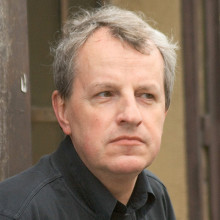Polish literature

Zbigniew Mentzel
(born 1951) writes fiction and journalism including regular columns in the weekly newspaper Tygodnik Powszechny and the daily Rzeczpospolita.
As a brilliant literary critic and section editor of the weekly paper Polityka, in the 1970s Zbigniew Mentzel published his first book, a satirical chronicle of cultural life entitled Stony Broke: the Final Months of the Polish People’s Republic. Next he published two collections of short pieces of prose that it is hard to categorise precisely by genre. These books, The Roving Footman and Mouthing a Dangerous Instrument include newspaper columns, mini-essays, autobiographical notes, all sorts of short comments and the germs of some purely literary tales. The thematic range of these miniatures is impressive, from personal matters via politics to economics (in the mid 1990s Mentzel became a regular investor on the stock market and is a commentator for the specialised press for financial experts).
In 2005 his only novel to date appeared, All the Languages in the World. The action takes place in Warsaw in the late 1990s in the course of a single day. The main character has to help his old father get to an important celebration, a farewell party at his workplace to say goodbye to his colleagues. He does this, but the main point are the reminiscences it sets in motion as he recalls events from his childhood and youth in the 1950s and 1960s, reveals some family secrets and describes his relationships with his closest relatives. But the most important thing in this novel is at the metaphoric level. The title refers to the hero’s personal failure – despite strenuous efforts he has never managed to master any foreign language. He is not concerned about practical ability, but about mastering a language in the literary sense. He longs to express himself, but gradually discovers that he cannot even do it in his own language. His dumbness seems to be a metaphor for certain unfulfilled ambitions almost in terms of a whole generation. Thus All the Languages in the World can be read as a novel about those who grew up in People’s Poland, whose youth went by in a miserable era and who were unable to give their life any deeper meaning.
BIBLIOGRAPHY
- Pod kreską. Ostatnie kwartały PRL, Londyn: Puls Publications Ltd, 1990.
- Laufer, Londyn: Puls Publications Ltd, 1998.
- Niebezpieczne narzędzie w ustach, Gdańsk: słowo/obraz terytoria, 2001.
- Wszystkie języki świata, Kraków: Znak, 2005.
- Czas ciekawy, czas niespokojny. Z Leszkiem Kołakowskim rozmawia Zbigniew Mentzel, Kraków: Znak, 2007
- Czas ciekawy, czas niespokojny. Z Leszkiem Kołakowskim rozmawia Zbigniew Mentzel. Część 2, Kraków: Znak, 2008
TRANSLATIONS
Russian:
- Vse jazyki mira [Wszystkie języki świata], Moskwa: NLO, 2006